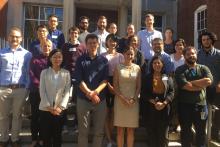CCB Postdoc Fellow Alumni
The CCB tracks the career development of former CCB Fellows, who have gone onto exciting activities in science. Read more about the research conducted by Fellow alumni within the CCB.
2022
Hector Bravo-Rivera, Ph.D. (NIMH)
Hector is a postdoc at the Unit for Neuromodulation and Synaptic Integration (UNSI) mentored by Dr Hugo Tejeda. His project focuses on the role of mesocortical dopamine in the resolution of approach/avoidance conflict.
He completed his PhD in the University of Puerto Rico School of Medicine in Dr Gregory Quirk’s lab where he focused on behavioral models of approach/avoidance conflict in rodents and non-human primates.
Andras Leko, M.D., Ph.D. (NIDA)
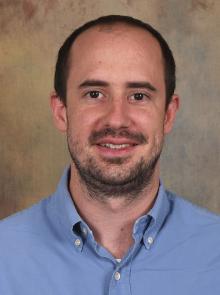
Dr. Leko is a Postdoctoral Visiting Fellow in the Section on Clinical Psychoneuroendocrinology and Neuropsychopharmacology (CPN), a joint laboratory of the National Institute on Drug Abuse (NIDA) and National Institute on Alcohol Abuse and Alcoholism (NIAAA) (P.I.: Dr. Lorenzo Leggio). As a 2022 CCB Fellow, he will investigate the Mineralocorticoid Receptor (MR) as a novel pharmacotherapeutic target in Alcohol Use Disorder (AUD) by conducting a Phase 1b human laboratory study with the MR-antagonist spironolactone. The study will examine pharmacokinetic (PK) and pharmacodynamic (PD) parameters of spironolactone and alcohol, during concomitant oral administration, and test the safety and tolerability of spironolactone, co-administered with alcohol, in individuals with AUD.
Dr. Leko received both his M.D. and Ph.D. in Neuroscience from Semmelweis University of Budapest, Hungary. His primary research focused on neural circuits responsible for maternal behavior. He identified insulin-like growth factor-1 (IGF-1) as a novel regulator of prolactin release and maternal motivation. More recently, he has applied transcriptome sequencing approaches to investigate genes responsible for maternal adaptation of the central nervous system and identified a potential role of the androgen receptor in the control of maternal behaviour. Dr. Leko began his residency in Psychiatry in 2017, in the Department of Psychiatry and Psychotherapy at Semmelweis University, Budapest.
Rachel Walker, Ph.D. (NIMH)

Rachel is a Postdoctoral Fellow working with Dr. Mario Penzo in the Unit on the Neurobiology of Affective Memory at the National Institute of Mental Health (NIMH). Broadly, her interests are in understanding the neural mechanisms behind fear memories and related defensive behaviors. As a CCB fellow, Rachel aims to uncover the neural circuitry underlying excessive avoidance behavior using whole brain imaging, optogenetics, and calcium imaging.
Rachel earned her Ph.D. in Behavioral Neuroscience from Boston College under the mentorship of Dr. Michael McDannald. During her Ph.D., Rachel investigated the neural basis of aversive prediction error signaling and the long-term impacts of early life stress.
2021
Yosuke Arima, Ph.D. (NIDA)
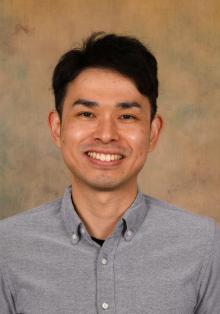
Yosuke is a postdoctoral fellow in the laboratory of Dr. Satoshi Ikemoto at National Institute on Drug Abuse (NIDA). His research interests are to understand neural mechanisms of motivation and reward. Especially, he investigates hypothalamic nuclei in reward-seeking and nicotine reinforcement behavior, using optogenetic and fiber photometry procedures in freely moving mice. In addition, he is developing a new mouse nicotine self-administration model.
Yosuke received his Ph.D. from Hiroshima University in Japan where he studied neurotoxic mechanism of organophosphorus agent such as sarin in vitro. He then joined the Department of Anatomy at Shimane University School of Medicine where he studied the projections of parabrachial neurons to orexin neurons. Yosuke enjoys basketball, jogging, biking, and hiking outside of the lab.
Nicholas Beacher, Ph.D. (NIDA)
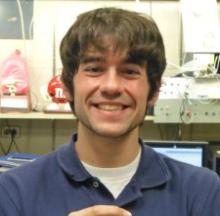
Nicholas is a Postdoctoral Fellow in Dr. Da-Ting Lin’s laboratory within the Neural Engineering Section of the National Institute on Drug Abuse (NIDA). As a CCB Fellow, Nicholas uses miniScope in vivo imaging to record neurons from freely moving transgenic rats to study how reward seeking behaviors are correlated with limbic neural activity. His longterm goal is to use miniScopes to uncover how choices are represented in the brain such as when animals choose to take, or ignore, opportunities to self-administer drugs of abuse.
Nicholas received his Ph.D. in Psychology: Behavioral and Systems Neuroscience from Rutgers University in 2020. At Rutgers he used electrophysiological techniques to study drug cue processing in rats self-administering cocaine. In his free time, Nicholas enjoys playing sports, fishing, and kayaking.
Adam Caccavano, Ph.D. (NICHD)
Adam is a post-doctoral CCB fellow interested in neuronal diversity and inhibitory micro-circuitry. In the lab of Dr. Chris McBain, Adam’s research focuses on how opioids modulate inhibition across different brain regions, species, and development.
Adam started his training in physics, earning a B.S. from the University of Oregon and M.S. from Portland State University. He then completed his Ph.D. in neuroscience at Georgetown University in the lab of Dr. Stefano Vicini, where his research focused on how inhibitory microcircuits become disrupted in Alzheimer’s disease.
Ying Duan, Ph.D. (NIDA)

Ying Duan is a postdoctoral fellow in the laboratory of Dr. Yihong Yang at the National Institute on Drug Abuse (NIDA). As a 2021 CCB Fellow, Ying focused on the involvement of lateral habenula circuits in compulsive drug-taking behaviors in rats, combining magnetic resonance imaging with pharmacological or DREADDs modulation technologies.
Ying received her Ph.D. in healthy psychology at the University of the Chinese Academy of Sciences in 2019. Her Ph.D. work focused on exploring the roles of L-type calcium channels in incubation of cocaine craving in the tree shrew (Tupaia belangeri) model. During her post-doc training, she is working on exploring neuronal mechanisms on compulsive drug-taking in rats.
Ayland Letsinger, Ph.D. (NIEHS)
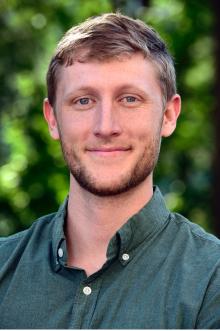
Dr. Letsinger is a 4th year postdoctoral fellow in the Ion Channel Physiology Group of the Neurobiology Lab at the National Institute of Environmental Health Sciences under the mentorship of Drs. Jerrel Yakel and Guohong Cui. He is currently studying brain circuits that are responsible for the initiation and persistence of wheel running in mice using fiber photometry and chemogenetics.
Dr. Letsinger received his PhD in Exercise Physiology as he found physical health to be essential for a happy life. He hopes to one day find a way to increase the pleasure associated with physical activity so more people will participate and gain the many benefits.
Thien Nguyen, Ph.D. (NICHD)

Thien is a Postdoctoral Visiting Fellow at the Section on Translational Biophotonics under Dr. Amir Gandjbakhche. In her lab, she involves in many different projects such as development of a wearable device to monitor pregnancy health and utilization of a multimodal NIRS/EEG to identify early neuronal biomarkers of autism disorder spectrum in infants and toddlers. As a CCB fellow, Thien proposed to investigate the correlation between the autistic traits and the frontal functional connectivity during a resting state and during an inhibition task. Her long-term goal is to identify cerebral functional connectivity networks, which can be used to predict autism in infants and toddlers.
Thien received her PhD in biomedical engineering from Gwangju Institute of Science and Technology in 2019. During her PhD program, she developed and applied optical systems to monitor cerebral hemodynamic responses in different cognitive states and to measure tissue oxygen saturation.
Thien can memorize a broad map but often fail to recognize left and right sides. If you ask her direction to go somewhere, it is better to ignore what she says but follow where she points.
Lorenzo Sansalone, Ph.D. (NINDS)
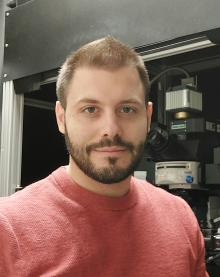
Lorenzo is a postdoctoral scientist in the laboratory of Dr. Zayd Khaliq at the National Institute of Neurological Disorders and Stroke (NINDS) where he studies the cellular neurophysiology of dopaminergic transmission. Lorenzo was first awarded the CCB fellowship in 2021 to explore the intrinsic physiological properties of motor- and non-motor related dopaminergic subpopulations, within the midbrain, in order to better understand how their physiology can shape common phenotypic behaviors observed in pathological conditions involving the basal ganglia, such as Parkinson’s disease (PD), obsessive-compulsive disorder (OCD) and schizophrenia. Lorenzo’s long-term interest is to elucidate unknown neuronal physiological properties and pathways to identify novel biological targets for the development of more effective therapeutics for CNS-related disorders.
Lorenzo earned a Laurea Diploma (BSc + MSc) in Medicinal Chemistry and Pharmaceutical Technologies from the University of Milan (Italy) in 2013 and received a PhD in Organic Chemistry from the University of Miami (USA) in 2018. After a 2-year appointment, as a postdoctoral fellow, in the Department of Neuroscience of the Icahn School of Medicine at Mount Sinai Hospital in New York City, Lorenzo joined the cellular neurophysiology section of NINDS in 2020 as a postdoctoral researcher.
Sudhuman Singh, Ph.D. (NCCIH)

Dr. Sudhuman Singh is a visiting post-doctoral fellow at the Section on Behavioral Neurocircuitry and Cellular Plasticity, led by Dr. Yarimar Carrasquillo at National Center for Complementary and Integrative Health (NCCIH). As a 2021 CCB fellow, Dr. Singh will be investigating cell type and projection specific role of CeA to zona incerta pathway in pain related affective behavior. To achieve this, he will combine aversive behavior, virus based anatomical tracing, in-vivo chemogenetics, optogenetics and fiber photometry approach to characterize and manipulate neuronal pathway.
Dr. Singh is interested in understanding the neural mechanisms underlying cognitive and neuropathological conditions and has trained in multidisciplinary research fields in neuroscience, including sleep, reinforcement learning, and pain. He earned his PhD in sleep biology from Jawaharlal Nehru University, India. Outside the lab, Dr. Singh enjoys walking, experiments in cooking, photography, spending time with family and friends.
Josephin Wagner, M.D. (NIAAA)
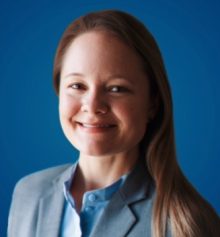
Josephin Wagner joined the Section on Clinical Genomics and Experimental Therapeutics (CGET) at NIAAA in September 2020. Her main goal is to understand the pathophysiology and neurobiology of alcohol use disorder and ischemic stroke, studying neuroinflammation, oxidative stress and blood brain barrier changes with epigenetic and pharmacological approaches. Josephin is also the associate investigator and research physician in a human clinical trial using Alirocumab in a Phase 1 study in heavy drinkers.
Josephin earned her MD at Charité - Universitätsmedizin Berlin in Germany and a MS in Medical Biology at the University of Zurich in Switzerland. Working as a researcher and a doctor in the Department of Neurosurgery at the University Hospital in Zurich, she gained a broad background in neuroscience, with specific expertise in molecular changes on the microvascular level after stroke. After her time as a postdoc, her goal is to become a US board-certified psychiatrist.
Marios Panayi, Ph.D. (NIDA)
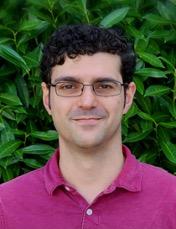
Marios is a Research Fellow in Dr. Geoffrey Schoenbaum’s lab at the National Institute on Drug Abuse (NIDA), examining the role of orbitofrontal cortex in the representation of flexible cognitive maps. As a CCB fellow, his project is focused on understanding and treating the long-term behavioral and neural changes caused by a history of cocaine self-administration in a preclinical rodent model. The project has successfully tested the therapeutic efficacy of a novel dopamine D3-receptor antagonist, developed by Dr. Amy Newman (NIDA), and is now focused on electrophysiological recording to test whether the treatment also acts upon the underlying orbitofrontal task representations that are disrupted by cocaine use.
Marios received his BPsychol. in 2009 and Ph.D. at the University of New South Wales in 2015 in Psychology. His graduate research focused on manipulating and understanding the function of the orbitofrontal cortex from a fundamental associative learning theory perspective. In 2016 he joined the labs of Prof. David Bannerman and Prof. Mark Walton at the University of Oxford. There he used a genetic mouse model relevant to schizophrenia, and in-vivo fast-scan cyclic voltammetry, to investigate how glutamatergic dysfunction can lead to a hyper-dopaminergic state that underlies aberrant salience in psychosis.
Wen-Chieh Hsieh, Ph.D. (NICHD)
CCB Project Title:
Multilayered control of KaiR1D cellular trafficking and synaptic recruitment
Geoffrey Vargish, Ph.D. (NICHD)
CCB Project Title:
Circuit dissection of dentate gyrus mossy cells and their role in pattern separation
2020
Sebastiano Bariselli, Ph.D. (NIAAA)
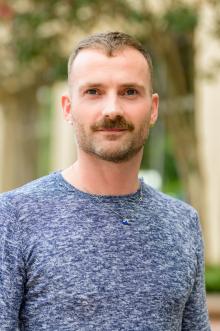
Fetal alcohol exposure has devastating neurobehavioral consequences that protract into adulthood. In the Laboratory for Integrative Neuroscience (LIN) at NIAAA, Sebastiano combines optogenetic, ex vivo and in vivo neuronal activity recordings to investigate how ethanol exposure during early periods of development affects corticostriatal circuits to produce cognitive and motor dysfunctions. Understanding the relative contribution of synaptic and circuit maladaptations in specific brain circuits will expand the paucity of therapeutic interventions currently available for patients affected by Fetal Alcohol Spectrum Disorder (FASD).
Sebastiano received his BSc and MSc in Pharmaceutical Biotechnology from the University of Milano (Italy) in 2009 and 2012. During his PhD, Sebastiano investigated the effects of downregulation of autism spectrum disorder (ASD)-associated genes (SHANK3 and Neuroligin 3) on VTA dopamine neuron function. Sebastiano obtained his PhD in 2016 and moved to NIH in the laboratory of Dr. Kravitz to investigate the effects of hyperdopaminergic states on corticostriatal plasticity in vivo. In 2019, Sebastiano joined the laboratory of Dr. Lovinger, where he is currently investigating the impact of gestational ethanol exposure on different striatal cell types.
Coleman Calva, Ph.D. (NIDA)
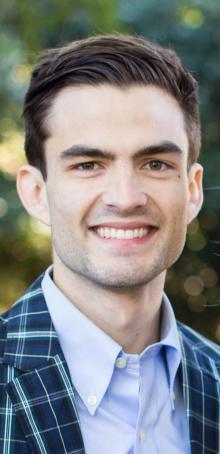
Cole is a 2020 CCB Fellow working at the National Institute on Drug Abuse (NIDA) in the laboratory of Dr. Satoshi Ikemoto. Cole’s primary research interests are related to the neural mechanisms underlying risk-taking behavior and the interactions between uncertain environmental stimuli and risk-taking. For his CCB research project, he aims to understand how medial septum glutamate neurons and their functional connections encode information related to uncertainty. Specifically, Cole’s research will combine optogenetics and in-vivo recording methods to investigate how uncertain rewards and punishments modulate the native neuronal activity of these neurons and whether optogenetic manipulations of inputs to these neurons affect uncertainty-driven behavior.
Cole received a B.S. in Biochemistry from North Carolina State University in 2013 and received his Ph.D. in Integrated Biomedical Science from the University of South Carolina in 2019. For his dissertation, he worked under the mentorship of Dr. Jim Fadel and combined immunohistochemistry, in-vivo microdialysis and cognitive behavioral paradigms to investigate the effects of intranasal orexin administration on age-related cognitive decline.
Emma Condy, Ph.D. (NIMH)

Emma is a Research Fellow in the Neurodevelopmental and Behavioral Phenotyping Service (NBPS) at the National Institute of Mental Health. As a 3rd year CCB fellow, her project is investigating the measurement and neural mechanisms of restricted repetitive behaviors (RRBs) in neurodevelopmental disorders under the mentorship of her primary mentor, Dr. Audrey Thurm, and Dr. Amir Gandjbakhche (NICHD). The project first aims to evaluate the psychometric properties of a caregiver RRB questionnaire across individuals with autism spectrum disorder and intellectual disability. Then, using this measure, RRB neural mechanisms will be investigated through functional near-infrared spectroscopy and psychophysiological metrics (e.g., heart rate variability) to interrogate how the central and autonomic nervous system contribute to RRB profiles in autism spectrum disorder and intellectual disability.
Emma received her A.B. in Biology & Psychology from Bryn Mawr College in 2012 and her Ph.D. in Psychology with a concentration in Biological Psychology from Virginia Tech in 2018. Her training has focused on affordable, accessible methods with low participant burden to maximize inclusion in neurodevelopmental disorder research. During her graduate training she gained methodological expertise in psychophysiological measurement to index autonomic nervous system functioning in children with autism spectrum disorder. She then trained in functional near-infrared spectroscopy through the NIH’s Graduate Partnership Program in the Section on Translational Biophotonics (PI: Gandjbakhche, NICHD). Now, she is combining these experiences with her postdoctoral training in behavioral phenotyping through the NBPS (Director: Thurm, NIMH) in her CCB project.
Rosario Jaime-Lara, Ph.D., FNP-BC (NIAAA)

Rosario’s research has focused on studying eating behavior, including the neurophysiology of eating behavior in the context of obesity and health. She was awarded the CCB fellowship in 2020 and her project focused on striatal mitochondrial dysfunction in chemo-sensation and eating behavior, and the activity and phenotype of dopamine neurons following a high fat diet. In 2022 Rosario and Rodolfo Flores were awarded the CCB Seed Grant Fellowship to examine how alcohol seeking behavior in the presence of threats affects approach-avoidance strategies in mice and examine how a history of HFD feeding affects reward-seeking behaviors during conflict.
Rosario received her Ph.D. from the University of Pennsylvania in 2018 and her dissertation focused on nutritional neuroscience. In 2014, she obtained her training as a Family Nurse Practitioner and received her Master’s in Nursing from Columbia University. She received a bachelor’s degree in Nursing from Columbia University and a bachelor’s degree in Biology with an emphasis on neurobiology, physiology, and behavior from The University of California Davis.
Brenton Laing, Ph.D (NIDA)
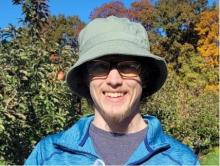
Brenton Laing is a postdoctoral fellow in Dr. Yeka Aponte’s lab at the National Institute on Drug Abuse. His project is focused on significant increases in grooming behavior that are triggered following threatening experiences and anterior hypothalamic area activation. He seeks to use manipulations of threat-responsive neurons to reduce stress-induced behavioral changes.
Brenton earned his PhD in Bioenergetics and Exercise Science working with Dr. Hu Huang at East Carolina University. His dissertation examined the effects of hunger and exercise on adaptations in the arcuate nucleus of the hypothalamus. He has combined the expertise he gained in electrophysiology in his doctoral work with optogenetics and calcium imaging during his postdoctoral work to interrogate hypothalamic relay circuits that control threat responding. In his free time he likes to train his dogs and play Jenga.
Rodolfo Flores Garcia, Ph.D. (NIMH)

Dr. Rodolfo Flores Garcia is a first year CCB and Postdoctoral Fellow in the Unit of Neuromodulation and Synaptic Integration led by Dr. Hugo Tejeda at the National Institute of Mental Health. As a CCB Fellow, Dr. Flores will study the motivational and emotional neural circuits implicated in the pathophysiology of psychiatric disorders, involving compulsive reward-seeking or avoidance. To achieve this, he will combine transgenic/viral approaches, single-cell Ca2+ imaging, optogenetics, and machine learning. Dr. Flores earned his Ph.D. Behavioral Neuroscience from the University of Texas at El Paso (2019) studying sex differences and the role of ovarian hormones in modulating the rewarding effects of nicotine and the aversive effects of nicotine withdrawal in rats. When outside the lab, Dr. Flores enjoys spending time with his family, exercising, and reading detective novels.
Ayesha Sengupta, Ph.D. (NIDA)

Ayesha is a post-doctoral fellow at the National Institute on Drug Addiction and is co-mentored by Dr. Geoffrey Schoenbaum and Dr. Mario Penzo (National Institute of Mental Health). Her research investigates infralimbic cortical function in the regulation of motivational conflict in adolescence. Ayesha will combine ex vivo and in vivo approaches to study the activity of neural circuits and how this drives behaviour in environments with conflicting emotional cues. To this end, she will use slice electrophysiology, anatomical tracing, chemogenetics and fibre photometry to characterise and manipulate neuronal pathways during complex behavioural tasks.
Ayesha completed her undergraduate degree at the University of Cambridge before pursuing graduate training at the University of Oxford and the National Institute on Alcohol Abuse and Alcoholism. Her PhD thesis work explored mechanisms of serotonergic control in fear-related neural circuits and behaviour.
Ewa Galaj, Ph.D. (NIDA)
Ewa is a Postdoctoral Fellow in the Addiction Biology Lab of the Molecular Targets and Medications Discovery Branch at the National Institute on Drug Abuse Intramural Research Program. As a 2021 CCB Fellow, Ewa will be examining the function of dopamine D3 receptors in addictive-like behaviors. By combining gold standard animal models of drug abuse with pharmacological and transgenic approaches she will delineate the roles of presynaptic vs postsynaptic mesolimbic dopamine D3 receptors in cocaine self-administration and relapse. The project is part of her overall research interests in D3 receptors as a critical component of the underlying neuronal circuitries involved in addiction and as potential therapeutic targets.
Ewa received her Ph.D. from the Graduate Center of City University of New York, where she studied the therapeutic potential of D3R antagonists in the treatment of substance use disorders. She then moved to Binghamton University, where she studied the effects of adolescent alcohol exposure on reward-related learning and associated alterations in the forebrain.
Julia Linke, Ph.D. (NIMH)
Project Title:
"Connectivity changes related to frustration and (in)flexible attentional shifting"
Saumitra Choudhury, Ph.D. (NICHD)
Project Title:
"Establish a novel ALFA-tag/Nanobody system for in vivo detection and functional reconstitution of synaptic proteins"
Ryan Shepard, Ph.D. (NINDS)
Project Title:
"Effect of Shisa7 deletion on lateral habenula physiology: Implications for disrupted GABAergic inhibition in obsessive compulsive disorder"
Justin Siemian, Ph.D. (NIDA)
Project Title:
"The Effects of Lateral Hypothalamic Leptin Receptor-Expressing Neurons on Cocaine Self-Administration in Mice"
2019
Zak Brodnik, Ph.D. (NIDA)
2019 CCB Fellow
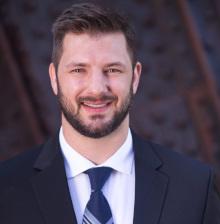
Zachary is a 2019 CCB Fellow working in the NIDA IRP’s Neuronal Networks Section under Marisela Morales. His work is focused on defining the neural circuitry and neuropharmacology that mediate flexible decision making under changing conditions. In this work, he is employing in vivo methods for measuring neuronal activity during reversal learning, as well as in vivo and in vitro methods for measuring the impact of this neuronal activity on acetylcholine and dopamine signaling in the dorsomedial striatum.
Zachary received his Ph.D. from Drexel University where he studied the behavioral and neuropharmacological predictors of cocaine use vulnerability following traumatic stress.
Isabel De Araujo Salgado, Ph.D. (NIDDK)

2019 CCB Fellow
Isabel De Araujo Salgado earned her Ph.D. in Neuroscience from the University of Fribourg (Switzerland) where she studied neuronal circuits matching body metabolic signals and behaviors using electrophysiology, behavioral testing, chemogenetics, circuit mapping, and viral vector technologies. Since graduating in 2018, she has taken a postdoctoral position in the laboratory of Dr. Michael Krashes at NIDDK. There, she investigates the integration of metabolic states and external cues to combat states of compulsivity – specifically, the neuronal circuits orchestrating the choice between eating and threat avoidance.
Ida Fredriksson, Pharm.D., Ph.D. (NIDA)
2019 CCB Fellow
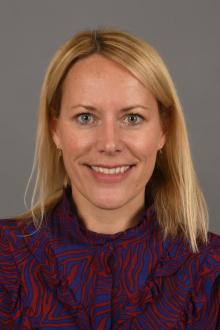
Ida is a first year CCB Fellow and Postdoctoral Fellow in the laboratory of Dr. Yavin Shaham at the National Institute on Drug Abuse (NIDA). As a CCB Fellow, Ida will study the neural circuitry and mechanisms that mediate incubation of oxycodone craving after abstinence due to negative consequences.
Ida received her Pharm.D. from Uppsala University (Sweden) in 2011 and obtained her Ph.D. in Neuroscience from the Karolinska Institutet (Sweden) in 2017. Her Ph.D. work focused on testing potential new treatments in rodent models of alcohol use disorder. During her Ph.D, she also spent 1.5 years at NIDA where she studied whether there is a biological basis for the gateway hypothesis with rat models.
Oliver Goral, Ph.D. (NIEHS)
2019 CCB Fellow

Prior to accepting his postdoctoral fellowship in the laboratory of Dr. Jerrel Yakel at NIEHS, Oliver Goral received his Ph.D. in Biochemistry and Biophysics from the University of Jena (Germany) and completed postdoctoral training at the University of Iowa. His long-term research interests include investigating ion-channel function and neurotransmitter release to better understand the role of neuromodulatory effects on synaptic plasticity in neurons as well as how the brain regulates efficient information transfer and computation.
Andrew Kesner, Ph.D. (NIAAA)
2019 CCB Fellow
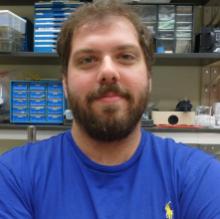
Andrew Kesner is a postdoctoral fellow in Dr. David Lovinger's Laboratory for Integrative Neuroscience at the National Institute on Alcohol Abuse and Alcoholism (NIAAA). His overarching scientific interest is in the neural mechanism of motivated behavior and how these mechanisms go awry in psychiatric disorders. He earned both his B.A. in Behavioral Biology (2012) and PhD in Biology (2018) from Johns Hopkins University. He performed his thesis research in the lab of Dr. Satoshi Ikemoto at the National Institute on Drug Abuse (NIDA) as part of the NIH-Johns Hopkins Graduate Partnership Program, where he used optogenetics and in-vivo electrophysiology in awake, behaving mice to elucidate the roles of a novel brain reward system.
As a CCB Fellow, Andrew will study neural mechanisms mediating sleep disruption and other motivated behaviors resulting from withdrawal from THC, the main psychoactive substance in marijuana. He has formed collaborations with colleagues within his home institute at NIAAA in addition to colleagues at NIDA and the National Institute on Mental Health (NIMH). Andrew is excited to be a CCB Fellow and looks forward to furthering the CCB mission.
Jisoo Lee, Ph.D. (NIAAA)
2019 CCB Fellow

Jisoo Lee is a Postdoctoral Fellow in the Section on Clinical Genomics and Experimental Therapeutics, Dr. Falk Lohoff's laboratory at the National Institute on Alcohol Abuse and Alcoholism (NIAAA). During her time as a CCB Fellow, she hopes to understand the underlying mechanism of alcohol use disorder (AUD) and to find a new pharmacological target in alcohol dependence.
Jisoo earned her Ph.D. in Pharmacology at Georgetown University where she studied a molecular pathway of activity-dependent Amyloid Precursor Protein processing in Alzheimer's disease using in vitro cell cultures and in vivo animal models. She has focused on her postdoctoral work on investigating the effects of proprotein convertase subtilisin/kexin type 9 on neuroinflammation, as well as emotional and behavior changes induced by chronic alcohol exposure using animal models of AUD.
Outside of the lab, Jisoo enjoys playing tennis, biking, and cooking.
Jun Ma, Ph.D. (NIMH)
2019 CCB Fellow

Jun Ma, a 2019 CCB Fellow, is a Postdoctoral Fellow in the Unit on the Neurobiology of Affective Memory, National Institute of Mental Health under the mentorship of Mario A. Penzo. As a CCB Fellow, the goal of Jun's proposed research is to gain a better understanding of the PVT function in both positive and negative emotional responses. Specifically, Jun plans to use photometry (including fiber photometry, 1-photon and 2-photon) to record PVT activity and optogenetics to manipulate the activity of PVT circuits to assess behavioral changes that occur during compulsive fear stress.
Jun received his PhD degree in neurobiology from Chinese Academy of Sciences in 2016. Jun have a broad background in biology, psychology, and neuroscience, with specific training and expertise in performing behavioral experiments.
Tarun Madangopal, Ph.D. (NIDA)
2019 CCB Fellow
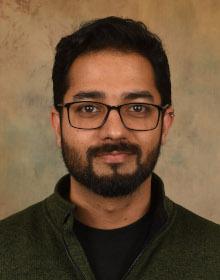
Tarun, a 2019 CCB Fellow, is a Research Fellow in the Neuronal Ensembles in Addiction Section at the National Institute on Drug Abuse. Under the mentorship of Dr. Bruce T. Hope, he is developing tools to longitudinally monitor neuronal activity during drug-taking and drug-seeking, and to permanently label neurons of interest with high temporal resolution during these behaviors. He can then investigate cellular, molecular and structural alterations specific to these tagged neurons following maladaptive drug-related behaviors.
As a CCB Fellow, he will apply these tools to study how maladaptive associations formed between drugs and drug-associated stimuli during drug-taking can trigger relapse long after a persons' last exposure to the drug.
Christopher Mazzone, Ph.D. (NIEHS)
2019 CCB Fellow
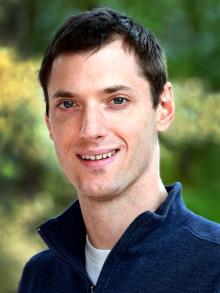
Chris is a Postdoctoral Fellow working with Dr. Guohong Cui in the Neurobiology Laboratory at the National Institute of Environmental Health Sciences (NIEHS) and Dr. Michael Krashes at the National Institute of Diabetes and Digestive and Kidney Diseases (NIDDK). Through his CCB Fellowship, he aims to determine how consumption of calorically dense foods, such as those high in fats, alters how hypothalamic and mesolimbic neurons respond to food and contribute to compulsive overeating.
Chris received a Ph.D. in Neuroscience from the University of North Carolina at Chapel Hill in 2017. For his dissertation, he worked under the mentorship of Dr. Thomas Kash and used electrophysiology in combination with opto- and chemogenetics to investigate neural signaling pathways within the extended amygdala that contribute to anxiety-related behavior. As a postdoctoral researcher, he explores how dietary choices influence the activity of neurons regulating appetite and reward.
Daria Piacentino, M.D., Ph.D. (NIAAA)
2019 CCB Fellow
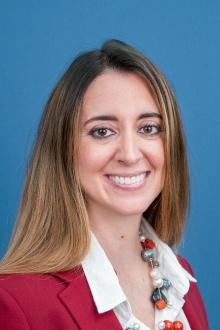
Daria Piacentino is a Postdoctoral Visiting Fellow in the Section on Clinical Psychoneuroendocrinology and Neuropsychopharmacology (CPN), a joint laboratory of the National Institute on Alcohol Abuse and Alcoholism (NIAAA) and National Institute on Drug Abuse (NIDA) (P.I.: Dr. Lorenzo Leggio). As a 2019 CCB Fellow, Daria will test the novel hypothesis that gut microbiome bidirectionally influences brain activity, more specifically alcohol drinking behavior. A translational approach is taken in that human-to-rodent microbiota transplantation will be performed. Her long-term goal is to identify new targets for the treatment of alcohol use disorders.
Beginning in 2020, along with Dr. Valerie Darcey, Dr. Piacentino conceptualized and spearheaded the development of the CCB Seed Grant, and led the initiative through its first funding cycles which fostered collaboration between CCB post-doctoral fellows.
Daria received both her M.D. and Ph.D. in Clinical Experimental Neurosciences and Psychiatry from Sapienza University of Rome. In 2013—2014, Dr. Piacentino was a Research Fellow at Sapienza University of Rome after being awarded an Italian Ministry of Research grant to investigate the use and misuse of anabolic steroids and new psychoactive drugs in a young sports population. In 2015 she received a Masters in Medical Statistics and Statistical Methods for Epidemiology from the University of Milan. In 2018, she completed clinical residency in Psychiatry at Sapienza University of Rome and Sant'Andrea Hospital. Her research has focused on the use of deep Transcranial Magnetic Stimulation for alcohol and cocaine use disorders, the effects of anabolic steroids and novel psychoactive substances in athletes, the implementation of statistical models to investigate the harm due to substance use disorder, and the psychopathology and role of the gut-brain axis in functional gastrointestinal disorders.
Patrick Piantadosi, Ph.D. (NIAAA)
2019 CCB Fellow

Patrick Piantadosi is a Postdoctoral Fellow under Dr. Andrew Holmes in the Laboratory of Behavioral and Genomic Neuroscience at the National Institute on Alcohol Abuse and Alcoholism. Patrick's research attempts to untangle the cortico-limbic-striatal circuits involved in punished reward-seeking. To address this, he is utilizing pharmacological, optogenetic, and in vivo imaging methods to manipulate and measure neural activity during complex behavior. Perseveration in the face of punishment is considered a hallmark of compulsivity, and these studies will highlight circuit interactions during adaptive and maladaptive forms of reward-seeking.
Patrick received his B.A. in Psychology from St. Mary's College of Maryland, followed by an M.A. and Ph.D. in Psychology (Behavioral Neuroscience) from the University of British Columbia, conducted in the laboratory of Dr. Stan Floresco. His graduate work focused on aversively motivated behavior, identifying regions of the cortex, amygdala, and nucleus accumbens that promote and inhibit actions in the face punishment.
When outside the lab, Patrick enjoys rock climbing, sports, and spending time with his dog, Mike.
Maia Pujara, Ph.D. (NIMH)
2019 CCB Fellow

Maia is a Postdoctoral Fellow in the Section on the Neurobiology of Learning and Memory in the Laboratory of Neuropsychology (NIMH) under Betsy Murray. As a 2019 CCB Fellow, Maia will be examining the causal role of the orbitofrontal-amygdala circuit in value-based decision making using behavioral testing, lesions, and fMRI in nonhuman primates. This project is part of her overall research interests on the causal neural substrates that guide flexible, goal-directed learning and decision making, with a specific focus on prefrontal cortex and its functional interactions with subcortical regions. Providing a basic mechanistic framework for how the brain sustains adaptive choice behavior will shed light on how dysfunction in dedicated circuits may lead to symptoms seen in disorders of compulsivity and impulsivity such as addiction, obsessive-compulsive disorder, and eating disorders.
Prior to joining the NIH as a Postdoctoral Fellow, Maia received her PhD in Neuroscience at the University of Wisconsin-Madison in 2016, where she studied neurological patients with ventromedial prefrontal cortex (vmPFC) damage using behavioral testing and fMRI to determine the role of vmPFC in guiding value-based decision making and modulating striatal activity during reward anticipation.
Hua Tang, Ph.D. (NIMH)
2019 CCB Fellow
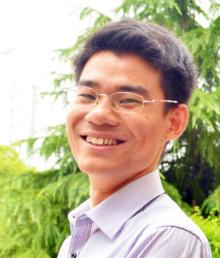
Hua Tang is a Postdoctoral Fellow in the Section on Learning and Decision Making in the Laboratory of Neuropsychology at the National Institute of Mental Health (NIMH). As a 2019 CCB Fellow, Hua aims to investigate the neural circuitry underlying reinforcement learning using a combination of high electrode count neurophysiology and inactivation techniques. These techniques will be applied in awake, behaving non-human primates (NHP).
Hua received his B.S. and Ph.D. from Nanchang University (China) in 2012 and 2018, respectively. He also received research training at Wake Forest University from 2015 to 2018 as a visiting Ph.D. student. During his Ph.D. program, he studied the neural basis of cost-benefit selections in rodents and the neural basis of how training improves working memory capacity in NHP.
Craig Werner, Ph.D. (NIDA)
2019 CCB Fellow
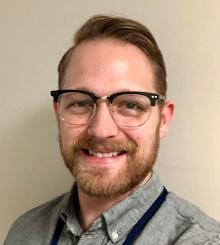
Craig is a Postdoctoral Fellow in the Neural Engineering Unit of the Behavioral Neuroscience Research Branch at the National Institute on Drug Abuse (NIDA). As a 2019 CCB Fellow, Craig is studying how neural ensembles encode compulsive food seeking using miniaturized fluorescent microscopy (miniScope) imaging techniques. His long-term goal is to understand how microcircuits in the brain encode reward seeking in substance use disorder and relapse.
Craig received his Ph.D. in Neuroscience from Rosalind Franklin University of Medicine and Science in 2015. During his graduate training, he used preclinical models to study molecular mechanisms underlying synaptic plasticity during drug abstinence and relapse.
Yan Zhang, Ph.D. (NIDA)
2019 CCB Fellow

Yan, a Postdoctoral Fellow in the laboratory of Dr. Da-Ting Lin at the Neural Engineering Unit in the National Institute on Drug Abuse (NIDA), studies neuronal circuit dysfunction and mechanisms leading to compulsive reward seeking and taking. With the miniScope imaging system to record activity of hundreds of neurons in deep brain regions of freely moving animals, her research goal as a 2019 CCB Fellow is to explore new targets for the treatment of drug abuse without affecting natural reward.
Yan received her Ph.D. in neuropsychopharmacology from Peking University (China) in 2015. During her Ph.D. program, she investigated the neurobiological mechanisms and treatment underlying reward process.
Chloe Jordan, Ph.D. (NIDA)
2019-2020 CCB Fellow
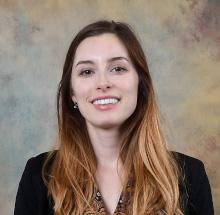
Chloe, a 2019 CCB fellow, is a post-doctoral researcher in the Addiction Biology Unit of the Molecular Targets and Medications Discovery Branch at the National Institute on Drug Abuse Intramural Research Program. As a CCB Fellow, Chloe will study the role of the dopamine D3 receptor, specifically in the insular cortex, in mediating both opioid abuse and analgesia. These investigations are based on her discoveries that dopamine D3 receptor antagonists paradoxically reduce opioid reward while augmenting analgesia, and that D3 receptors are strongly expressed in the insular cortex, a region of the brain whose dysfunction is implicated in compulsive drug abuse as well as pain sensation. By disentangling the neural substrates linking opioids’ addictive liability with their clinical utility, Chloe aims to generate fresh insights into new and more precise therapeutics for both addiction and pain.
Chloe received her Ph.D. from Boston University in Boston, Massachusetts, where she studied comorbid attention-deficit/hyperactivity disorder and cocaine abuse in rodent models. She then moved to McLean Hospital/Harvard Medical School, where she investigated neurodevelopmental risk factors and preventative interventions for adolescent cocaine use. Chloe joined the NIDA-IRP in 2017. Her current research interests include dissecting cell type-specific neural circuits underlying drug (cannabis, cocaine, and opioid) reward and aversion using transgenic and optogenetic approaches, and neurochemical mechanism-driven medication development for the treatment of substance use disorders.
2018
Valerie Darcey, Ph.D. (NIDDK)
2018–2019 CCB Fellow
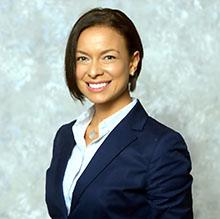
Valerie is a Postdoctoral Fellow in the lab of Kevin Hall National Institute of Diabetes and Digestive and Kidney Diseases (NIDDK). As a 2018 CCB Fellow, she hopes to explore how diet might influence the function of brain structures underlying our habits and goal directed behaviors. Additionally, she is conducting a controlled clinical study as part of her postdoctoral work in order to investigate the relationship between striatal dopamine D2 receptor availability, body weight, and eating behavior.
Beginning in 2020, along with Dr. Daria Piacentino, Dr. Darcey conceptualized and spearheaded the development of the CCB Seed Grant, and led the initiative through its first funding cycles which fostered collaboration between CCB post-doctoral fellows.
She earned her B.A. in Biological Basis of Behavior at the University of Pennsylvania and an M.S. in Human Nutrition from Drexel University before completing her dietetic nutrition internship at the NIH Clinical Center and becoming a Registered Dietitian. She earned her Ph.D. in Neuroscience from the Interdisciplinary Program in Neuroscience at Georgetown University where she studied the relationship between omega-3 fatty acids and development of prefrontal cortex-mediated impulse control in adolescents.
Outside of the lab, Valerie is an avid runner who loves to cook and bake (occasionally, given the right recipe)!
Stephanie Gantz, Ph.D. (NIDA)
2018–2019 CCB Fellow
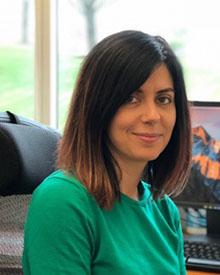
Stephanie's initial project as a 2018 CCB Fellow is an investigation of G protein-coupled α1 adrenergic receptor-mediated synaptic input onto serotonergic neurons, laying the fundamental framework towards understanding noradrenergic control of serotonin neuronal circuits. This work coincides with the research she is doing as a Postdoctoral Fellow in Carl Lupica's laboratory at the National Institute on Drug Abuse (NIDA). There, she is merging her training as an ion channel and synaptic electrophysiologist with optogenetic and behavioral neuroscience approaches to understand the many fundamental ways by which G protein-coupled receptors influence neuronal excitability and synaptic transmission, in physiological and pathological contexts.
Stephanie received her B.A. in Biology from Reed College in 2007 and her Ph.D. in Neuroscience from the Vollum Institute at Oregon Health & Science University in 2015. She started her research career with John Williams studying elements that regulate dopamine transmission in the ventral midbrain. After obtaining her degree, she trained as a Postdoctoral Fellow in Dr. Bruce Bean's laboratory at Harvard Medical School where she studied endocannabinoids.
Matthew Gardner, Ph.D. (NIDA)
2018–2019 CCB Fellow
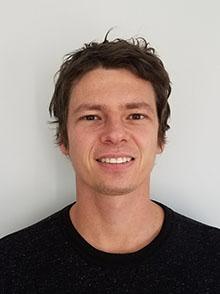
As a 2018 CCB Fellow, Matthew is employing optogenetics and electrophysiology in an attempt to understand how neural systems represent predictions about future events in the world. More specifically, his research has focused on how the brain’s frontal regions, in particular the orbitofrontal cortex, contribute to different aspects of decision making. He is currently a Postdoctoral Fellow in the lab of Geoffrey Schoenbaum at the National Institute on Drug Abuse (NIDA).
Matthew received his Ph.D. from Stony Brook University in 2014 while studying the role of expectation in the processing of appetitive stimuli under the mentorship of Alfredo Fontanini.
Renata Marchette, Pharm.D. (NIDA)
2018–2019 CCB Fellow
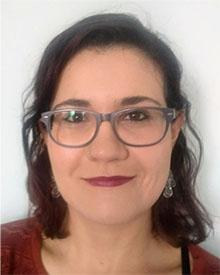
Renata is a Postdoctoral Fellow at the Neurobiology of Addiction Section under George F. Koob. As a 2018 CCB Fellow, Renata is developing novel mouse models of opioid addiction to study the role of reward- and stress-related neurotransmitters and sexual dimorphism in compulsive-like drug taking and seeking. Her long-term goal is to identify new targets for the treatment of drug use disorders.
Renata received her Pharm.D. from Sao Paulo State University (Brazil) in 2011 and obtained her M.S. and Ph.D. in Pharmacology from Federal University of Santa Catarina (Brazil) in 2013 and 2017, respectively. During her Ph.D. program she systematically investigated the involvement of the HPA axis and the tachykinergic system in vulnerability and resilience to social defeat stress in mice.
In her free time, Renata enjoys reading fantasy/science fiction, practicing yoga, and hiking.
Vaughn Steele, Ph.D. (NIDA)
2018–2019 CCB Fellow
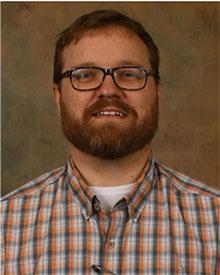
A Postdoctoral Fellow in the lab of Elliot Stein in the Neuroimaging Research Branch at National Institute on Drug abuse (NIDA), Vaughn is a 2018 CCB Fellow who is implementing a randomized clinical trial to test whether transcranial magnetic stimulation targeting previously identified biomarkers modulates compulsive behavior and its underlying neurocircuitry in cocaine users.
He earned his Ph.D. in psychology from the University of Minnesota with an emphasis in cognitive and biological psychology. His postdoctoral training prior to moving to NIDA focused on identifying biomarkers of substance abuse treatment outcomes.
Mehdi Farokhnia, M.D. (NIAAA)
2018–2020 CCB Fellow
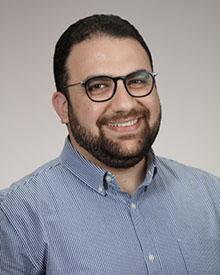
Mehdi, a 2018 CCB Fellow, is a Postdoctoral Fellow in the Section on Clinical Psychoneuroendocrinology and Neuropsychopharmacology (CPN), a joint laboratory of the National Institute on Alcohol Abuse and Alcoholism (NIAAA) and National Institute on Drug Abuse (NIDA). As a CCB Fellow, Mehdi will study the role of glucagon-like peptide-1 (GLP-1) and its pharmacotherapeutic implications in relation to compulsive alcohol use. This exploration relates to his overall postdoctoral research goal to identify novel targets to treat alcohol use disorder via a combination of behavioral, pharmacological, genetic, and neuroimaging methods. He is also interested in investigating human laboratory approaches that may best translate preclinical findings into clinical research, with a particular focus on behavioral pharmacology and substance use.
Mehdi received his medical degree from Tehran University of Medical Sciences, where he also got trained as a researcher by studying the neurobiology of psychiatric disorders such as depression and schizophrenia, and testing potential medications for these disorders through phase 2-3 clinical trials.
Peter Manza, Ph.D. (NIAAA)
2018–2019 CCB Fellow
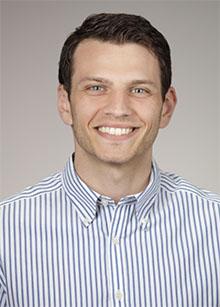
Pete Manza is a postdoctoral fellow in the lab of Dr. Nora Volkow at the National Institute on Alcohol Abuse and Alcoholism (NIAAA). He earned his PhD in integrative neuroscience from Stony Brook University, where he studied how dopaminergic medications influence cognition in Parkinson’s disease. Pete has focused his postdoctoral work on how negative emotionality erodes self-control and contributes to compulsive drug-taking. He uses fMRI, PET, and genetic markers to understand these processes. In his spare time, Pete enjoys playing sports, hiking, and playing guitar.
Eric Starr, Ph.D. (NICHD)
2018–2019 CCB Fellow
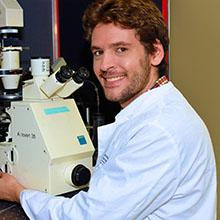
Eric is a Postdoctoral Fellow in the laboratory of Andrés Buonanno at the National Institute of Child and Human Development (NICHD). For his postdoctoral research and as a 2018 CCB Fellow, Eric is investigating how the neurotrophic factor, neuregulin, via activation of its associated receptor tyrosine kinase, ErbB4, modulates midbrain dopaminergic neuronal functioning in the central nervous system. His principal focus is to elucidate the cellular mechanisms by which neuregulin/ErbB4 signaling modulates distinct subpopulations of midbrain dopaminergic neurons that coordinate compulsive behaviors and cognition.
Eric earned his PhD. in Neurosciences and Neurological Disorders from the University of Toledo College of Medicine and Life Sciences where he investigated synaptic plasticity in the autonomic nervous system. When not conducting experiments, Eric enjoys spending time with his wife, being outdoors, and exercising.
Rosanna Marino, Ph.D. (NIDA)
2018–2019 CCB Fellow

Rosa Anna, a Postdoctoral Fellow in the lab of Antonello Bonci, National Institute of Drug Abuse (NIDA), is a 2018 CCB Fellow focused on assessing brain circuits involved in homeostatic addictive behaviors, particularly compulsive feeding and reward. In addition to the mentorship of Roy Wise and Ross McDevitt, she is training with the guidance of the Ex vivo Electrophysiology Core (EVEC) in NIDA. Her contributions to the Core will both greatly advance her own training and allow her to get involved in multiple projects lead by other IRP investigators. Her long-term goal is to continue studying the neural aspects of behaviors that lie at the core of neuropsychiatric human diseases such as obesity and substance use disorders.
Rosa Anna got her Ph.D. in Neuroscience and Behavioral Disorders from the University of Palermo, but performed her research at NIDA. There, she focused on providing a targeted assessment of the behavioral, anatomical, and electrophysiological contributions of serotonergic and nonserotonergic dorsal raphe nucleus neurons to reward processes.
2017
Michael Authement, Ph.D. (NIAAA)
2017–2019 CCB Fellow
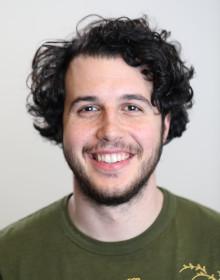
Michael is a Postdoctoral Fellow in the laboratory of Dr. Veronica Alvarez at the National Institute on Alcohol Abuse and Alcoholism (NIAAA). As a 2017–2019 CCB Fellow, Michael’s research is focused on the involvement of striatal cholinergic interneurons in compulsive behaviors. Specifically, he is interested in studying prefrontal cortex projections onto cholinergic interneurons and how they are affected by drugs of abuse.
Michael received a B.S. in Biological Science from McNeese State University in 2011 and completed his Ph.D. in Neuroscience under the mentorship of Dr. Fereshteh Nugent at the Uniformed Services University in 2017. His Ph.D. thesis focused on the effects of early life stress on midbrain reward circuitry.
When outside the lab, Michael enjoys swimming, historical longsword fencing and skiing.
Paul Kramer, Ph.D. (NINDS)
2017–2019 CCB Fellow
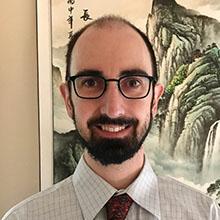
Paul is a Postdoctoral fellow in the laboratory of Zayd Khaliq, Ph.D., at the National Institute of Neurological Disorders and Stroke (NINDS). A constant theme throughout Paul’s training – and his focus as a 2017–2019 CCB Fellow – has been studying the cellular mechanisms induced by, and that contribute to, the abuse of illicit drugs. Paul was an ARCS Scholar during his doctoral work and was the recipient of the 2014 Oregon Brain Institute Fellowship.
Paul earned his bachelor’s degree in Psychology and Neuroscience from Grinnell College in 2009, and completed his Ph.D. in Neuroscience at the Vollum Institute in December of 2016 in the laboratory of John Williams. Between his B.A. and Ph.D., Paul was a post-baccalaureate fellow in the laboratory of Veronica Alvarez at the National Institute on Alcohol Abuse and Alcoholism (NIAAA).
When not in the lab, Paul likes to get away from technology by hiking through nature and listening to the wind.
Marco Venniro, Ph.D. (NIDA)
2017–2019 CCB Fellow
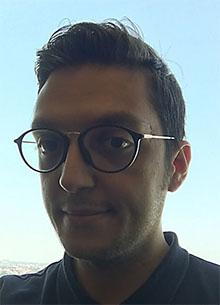
Marco, a 2017–2019 CCB Fellow and Postdoctoral Fellow in the laboratory of Dr. Yavin Shaham at the National Institute on Drug Abuse (NIDA), studies the neural circuitry and mechanisms that mediate relapse to substance use.
Marco received a Ph.D. in Pharmacology from the University of Palermo in 2012. Subsequently, he was invited to participate in the NIH Graduate Partnership Program. Following a 2-year fellowship at NIDA, he received his Ph.D. in translational biomedicine from the University of Verona in 2016. He has won numerous awards including a Fellows Award for Research Excellence from the National Institutes of Health and a travel award from European Behavioural Pharmacology Society.
Joanne Damborsky, Ph.D. (NIEHS)
2017–2019 CCB Fellow
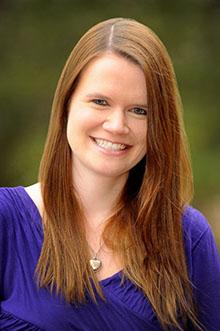
Joanne is a postdoctoral fellow in the laboratory of Jerrel Yakel at the National Institute of Environmental Health Sciences (NIEHS). Her research as a 2017–2019 CCB Fellow is focused on examining how cholinergic signaling modulates neuronal activity within the basal forebrain and the role that cholinergic neurons play in regulating compulsive and cognitive behaviors. She is especially interested in determining how functionally distinct subpopulations of cholinergic neurons can differentially impact neuronal function and behavior.
Joanne received a B.S. in Neuroscience from Tulane University, and a Ph.D. in Neuroscience from the Texas A&M Institute for Neuroscience. Upon graduating, she was given the Graduate Research Excellence Award by the Texas A&M College of Medicine in recognition of her scientific accomplishments and contributions to the graduate program. In addition to her research, Joanne has been actively involved in numerous teaching and outreach efforts at the NIEHS, and enjoys working with high school and college students.
Wambura Fobbs, Ph.D. (NIDDK)
2017–2019 CCB Fellow
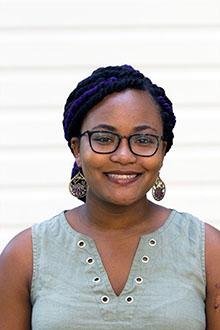
Wambura, a postdoctoral fellow in the lab of Alexxai Kravitz at the National Institute of Diabetes and Digestive and Kidney Diseases (NIDDK), is a 2017–2019 CCB Fellow. For her research, she is focused on elucidating neural and behavioral mechanisms that promote compulsive overeating in obesity and binge eating disorder. Her long-term goal is to continue studying motivated behaviors as an independent investigator and educator.
Wambura obtained her Ph.D. in Neuroscience from University of Washington, where she studied the role of cholinergic signaling in cost-benefit decision making in the lab of Sheri Mizumori. In addition to research, she enjoys sharing her scientific interests and enthusiasm with the public. She has participated in many outreach, mentorship, and teaching activities, but she is especially proud of the annual neuroscience-inspired art show that she started with a friend in grad school. She also enjoys collecting yarn, knitting, weaving, and playing with her energetic dog.
Wei Sun, Ph.D. (NIMH)
2017–2019 CCB Fellow

Wei is a 2017–2019 CCB Fellow and a Postdoctoral Fellow at the National Institute of Mental Health (NIMH) under the mentorship of Susan Amara. She is currently using functional genomics tools to study dopaminergic neurons and noradrenergic neurons in rodent models of ADHD.
Wei received her Bachelor of Medicine degree from the China Medical University before coming to the United States to pursue her Ph.D. degree in Neuroscience at the University of Rochester, where she studied transcriptomes and physiology of astrocytes in Maiken Nedergaard’s laboratory. There, she developed a strong interest in studying neurodevelopmental disorders.
Lauren Dobbs, Ph.D. (NIAAA)
2017–2018 CCB Fellow
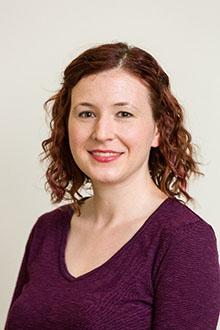
Lauren was a 2017 CCB Fellow while working in the Laboratory of Neurobiology of Compulsive Behaviors under Veronica Alvarez at the National Institute of Alcohol Abuse and Alcoholism (NIAAA). Her long-term research interest as a CCB Fellow aimed to uncover the neural substrates, synaptic mechanisms, and brain circuits underlying compulsive drug seeking and taking using sophisticated animal models with a high relevance toward human addiction.
Lauren received her Ph.D. in Behavioral Neuroscience from Oregon Health & Science University in 2012 where she used mouse models of drug taking and seeking to characterize the role of acetylcholine in methamphetamine locomotion, reward, and reinforcement. In January 2019, she will begin a tenure-track faculty position at the University of Texas at Austin in the Department of Neuroscience. Her laboratory will be housed within the Waggoner Center for Alcohol & Addiction Research and focus on dissecting the neural substrates and circuits of polysubstance abuse.
In her spare time, she enjoys playing with her son, practicing Shaolin Kung Fu, and going to concerts.
Matthew Sloan, M.D. (NIAAA)
2017–2018 CCB Fellow

Matthew was a CCB Fellow in 2017 working in the Section on Human Psychopharmacology at the National Institute on Alcohol Abuse and Alcoholism (NIAAA). His research employed novel human laboratory approaches to investigate how vulnerability for alcohol use disorder predicts alcohol consumption patterns in young adults. He also studied the relationship between endocannabinoid signaling and substance use by leveraging large databases.
Matthew completed medical school and psychiatry residency at McGill University in Montreal, Quebec and continues to maintain an active clinical practice in Montreal, which primarily focuses on treating individuals with dual diagnoses. He is currently doing an Addiction Psychiatry Fellowship at Yale School of Medicine, and remains at NIAAA as a Special Volunteer and Guest Researcher where he will continue to work on the research he undertook as a CCB Fellow.

